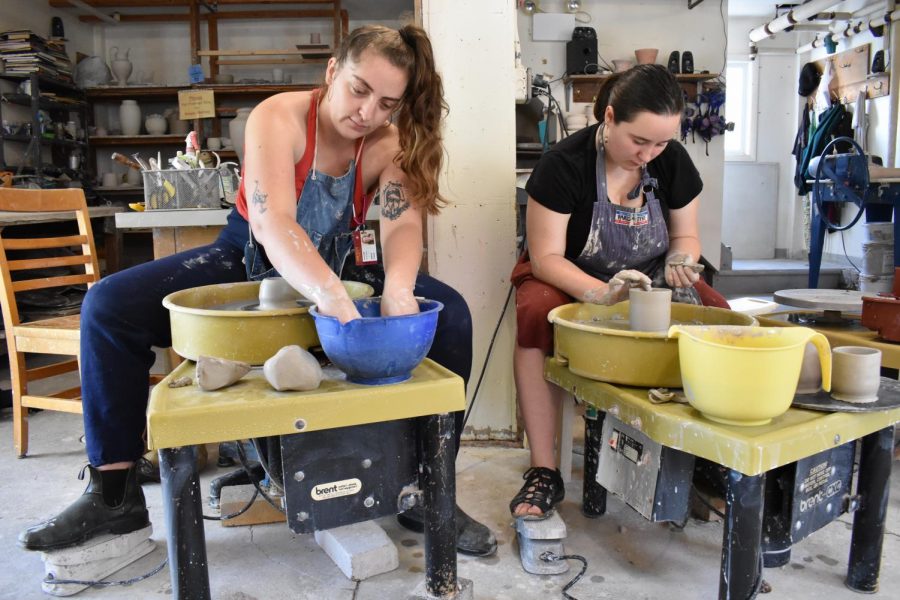Pottery Co-Op Provides Welcoming Space to New Members
Members of the Pottery Co-Op sit at potters wheels. The co-op aims to be an inclusive space for students of all levels who want to learn how to create pottery.
Watching potters work with clay is an almost hypnotic experience. They make the form look so easy, yet, they are creating a physical artifact that will exist in the world to be touched and used. Although clay seems to move effortlessly beneath expert fingers, for a novice, a piece can collapse into nothing but wet lumps.
Learning to work with ceramics can be intimidating. The skill is both artful and quite complicated, with different pottery styles and techniques requiring many unfamiliar tools and processes. For $30 a semester, though, Oberlin’s Pottery Co-op provides resources to students and community members who are dedicated to beginning or developing their craft.
“The [Pottery Co-op] is welcoming and inviting to people of all different skill levels,” wrote College junior Mecky Kuijpers, who was a member of the co-op during her first year, in an email to the Review.
Similar to dining and housing co-ops, the Pottery Co-op could not function without the support of its membership and student leaders. Within the co-op, a leadership committee organizes and oversees clay-making, firings, cleanings, and ExCo classes, among other tasks. Unlike housing and dining co-ops, members are only required to put in about five hours a semester for assigned maintenance tasks. They are also required to sign up for a two-hour cleaning shift when they renew their co-op membership.
“I learned to throw almost two years ago, during Winter Term of my sophomore year,” College senior Lulu Scherman wrote in an email to the Review. “It’s wild how quickly pottery has become a central element of my life both [inside] and outside of this town … I attribute that largely to the community I found at the Pottery Co-op.”
Scherman is the instructor of the Introductory Pottery ExCo, a course for people who have never worked with ceramics before. The entry-level class helps students learn the basics — how to use the wheel, create perfectly-centered pieces, and begin to conceptualize and execute their own works.
“They also learn what it takes to keep a pottery studio running — all the less glamorous but very essential dirty work,” Scherman explained.
The co-op also has opportunities for students looking for a challenge to expand their skills.
“The [Intermediate Pottery ExCo] is for students who have some experience with pottery, and feel pretty comfortable using the potters wheel,” wrote College senior and ExCo instructor Emma Dreyfuss in an email to the Review. “Students are therefore able to focus on making more conscious design choices and learning more complex forms like lidded jars or teapots.”
Scherman and Dreyfuss understand that the co-op can feel closed off at times, especially due to its limited space.
“We try to combat that inaccessibility, though, by offering office hours, during which anyone — students, faculty, and community members — can come in and learn to throw,” Scherman said. Office hours are held Monday from 1:00–2:00 p.m., Tuesdays from 3:30-4:30 p.m., Wednesdays from 12:00–1:00 p.m., Thursdays from 4:30–5:30 p.m., and Fridays from 1:30–2:30 p.m.
Dreyfuss emphasizes pottery’s capacity to improve mental health.
“I think that what makes pottery so important to me and many people who do it is the tactile, almost meditative aspect of working with clay,” she wrote. “It’s a very calming activity, but it also requires a lot of your focus, so it’s a very useful escape from anything stressful in your life.”
The co-op provides a place for people with similar artistic interests to work in each other’s company, but also has an outward focus. One of their community-oriented events is “Empty Bowls,” a holiday sale of beautiful ceramics pieces that directly benefits Oberlin Community Services. In addition to the sale, musicians and performers take to the stage to get in the spirit of the season.
“This year, we’re really trying to combat a feeling of exclusivity at the Pottery Co-op,” Scherman said. “It’s a space run by and for Oberlin students and community members.”











